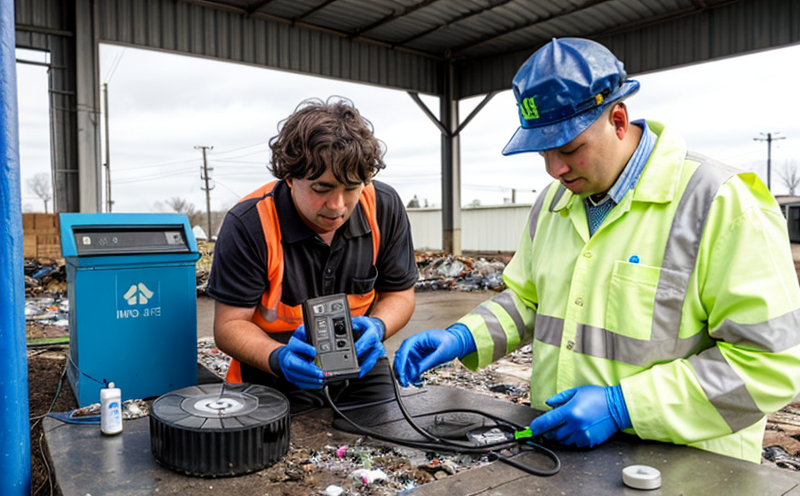ASTM D8295 Perfluorinated Substances in E-Waste Streams
The testing of perfluorinated substances (PFAS) in electronic waste streams, as described by ASTM D8295, is a critical process for ensuring environmental compliance and the safe recycling of e-waste. PFAS are persistent organic pollutants that have been used in various industrial applications, including electronic components, leading to their presence in e-waste. The presence of these substances can pose significant risks to human health and the environment.
The ASTM D8295 method provides a robust framework for quantifying perfluorinated compounds (PFCs) in solid waste streams derived from e-waste. This service is essential for quality managers, compliance officers, R&D engineers, and procurement professionals who are responsible for ensuring that the recycling processes adhere to international standards.
The testing involves several steps, including sample collection, extraction, and analysis using advanced chromatographic techniques such as high-performance liquid chromatography (HPLC) with tandem mass spectrometry (LC-MS/MS). This method allows for precise measurement of PFCs in the waste streams. The service ensures that all samples are processed according to ASTM D8295 guidelines, ensuring accurate and reliable results.
The significance of this test lies in its role in identifying and quantifying perfluorinated compounds within e-waste streams, which can then be managed appropriately. This is crucial for preventing the release of these harmful substances into the environment. Proper testing helps to ensure that recycling facilities are meeting both regulatory requirements and industry standards.
The ASTM D8295 method has been widely adopted due to its precision and reliability in detecting even trace amounts of PFAS. This ensures that recycled materials used in downstream products do not contain harmful levels of these substances, thus safeguarding the integrity of the recycling process.
| Sample Type | Extraction Method | Analytical Technique | Target PFCs |
|---|---|---|---|
| Solid Waste Streams | Aqueous Extraction and Solvent Extraction | HPLC-MS/MS | PFOA, PFOS, PFHxS, etc. |
The use of this method is not only important for environmental protection but also for the safety and health of workers involved in e-waste recycling. By identifying and quantifying PFCs, this service helps facilities to implement targeted remediation strategies where necessary, ensuring that all waste streams are handled responsibly.
In summary, ASTM D8295 testing is a vital component in the management of electronic waste streams, providing accurate data on perfluorinated compounds. This ensures compliance with international standards and supports sustainable recycling practices. The service offered by our laboratory focuses on delivering precise and reliable results, ensuring that clients can make informed decisions regarding their e-waste management processes.
Why It Matters
The importance of ASTM D8295 testing cannot be overstated in the context of electronic waste recycling. The presence of perfluorinated substances (PFAS) in e-waste poses significant environmental and health risks. PFAS are known to accumulate in ecosystems, leading to long-term contamination that can affect both wildlife and human populations.
The use of PFAS in certain electronic components means that they are likely to be present in the waste streams generated during recycling processes. If not properly managed, these substances can leach into soil and water supplies, causing widespread environmental damage. This is particularly concerning given the growing volume of e-waste being produced globally.
Compliance with ASTM D8295 ensures that recycling facilities are adhering to international standards for the detection and quantification of PFCs in solid waste streams. This not only helps in meeting regulatory requirements but also enhances the reputation of recycling companies by demonstrating a commitment to environmental stewardship.
The health implications of PFAS exposure cannot be ignored either. Studies have linked these compounds to various adverse effects on human health, including thyroid disease, high cholesterol, and immune system impairment. By ensuring that e-waste is properly managed through rigorous testing, we contribute to the protection of public health.
Furthermore, the use of ASTM D8295 testing supports sustainable practices in recycling by facilitating targeted remediation efforts where necessary. This ensures that all waste streams are handled responsibly and that only safe materials are reintroduced into the supply chain. The service provided by our laboratory plays a crucial role in promoting these environmentally friendly practices.
In conclusion, ASTM D8295 testing is essential for ensuring environmental compliance, protecting public health, and supporting sustainable recycling practices. By adhering to this standard, we contribute to a more responsible approach to e-waste management, ultimately fostering a greener future.
Benefits
- Compliance with international standards for PFAS detection.
- Precise quantification of PFCs in waste streams.
- Support for sustainable recycling practices.
- Rigorous quality assurance processes ensuring reliable results.
- Targeted remediation strategies based on accurate data.
- Enhanced reputation through adherence to environmental best practices.
- Protection of public health by minimizing PFAS exposure risks.
Industry Applications
| Industry Sector | Application |
|---|---|
| Electronics Manufacturing | Monitoring waste streams to ensure compliance with PFAS regulations. |
| E-waste Recycling Facilities | Identifying and quantifying PFCs in e-waste streams for proper disposal. |
| Sustainable Development Organizations | Conducting research on the environmental impact of PFAS in waste management. |
The ASTM D8295 method is widely used across various industries, particularly those involved in electronics manufacturing and e-waste recycling. By providing accurate data on PFCs present in waste streams, this service helps these sectors comply with regulatory requirements and promote sustainable practices.





